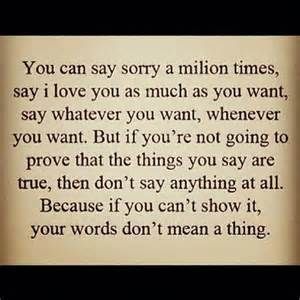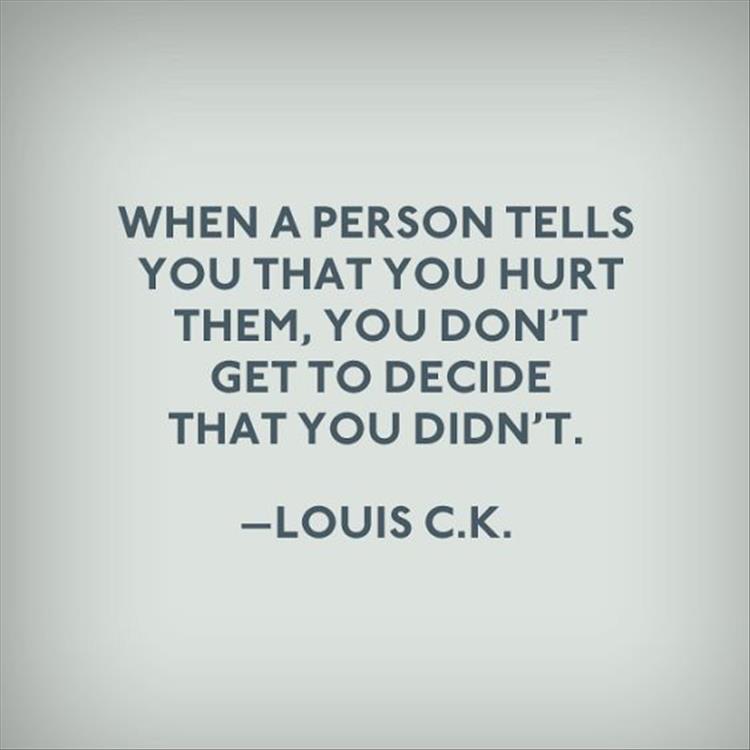The word sorry is an important word in our language and society, with the sentiment behind it holding even more value. It is often the hardest word to say, and its use must not only be convincing, followed by action, but it must also be timed correctly and used with sincerity. It can’t be over used either, or it loses its authenticity. It’s complicated to say the least!
In my last post I made reference to a falling out with a friend, that I did not handle to the best of my ability, allowing emotions to make a slave of me, and that was in part because I received an apology before I was ready. We have this expectation that the word, or even the sentiment should immediately quell the situation at bay and extinguish the fiery angry rage that someone may be feeling as a result of poor choices we may have made that affected and hurt them. In my own situation however, the anger and hurt that were burning in my heart were at full capacity, and a simple “I’m sorry” was a drop of water. Not nearly enough to extinguish the flames.
What transpired after that, which probably isn’t all that uncommon, was not too dissimilar to a situation I see between my 2 kids on a regular basis: One of them accidentally (or not) hurts the other one or ruins something that was important and the other is full of indignant rage. The first one quickly and relentlessly apologises, but the injured party screams back angrily “Well it is NOT ok?!” Following this, the one who made the mistake in the first place also becomes angry at this lack of acceptance of apology and begins blaming the injured party. Example: “You shouldn’t have left it there then!” Or “Well you started it.”
With adults it is usually a little bit more refined, but easily turns into a blaming match, where each of you blatantly lists every single flaw of the other, every thing they have ever done wrong and all the things that you quietly thought about them that you later wish you had kept quiet. When we are angry, it can be easy to forget all the things we like about someone and focus only on the negative! Ouch!
Yep, ok, guilty as charged for that one....
When I was able to acknowledge that part of the issue was that I had received an apology before I was ready to forgive, I looked it up, naturally. I came across this article, published on www.livingthebump.com by Lauren Vork, entitled; How to respond to an apology if still mad. In it the writer lists 4 key steps, these are:
1. Give it time.
2. Acknowledgement
3. When it’s not enough
4. Missing the point.
The gist of it is that it is important to tell your friend (or anybody else) that you are still angry and you need time for the anger to die down naturally before you can discuss it. (If you are the apologizing party, say you are sorry and then give the person space to digest it. Do not try and force someone to accept your apology or continue to apologise incessantly.) Thank the person for their apology if you believe they mean it, but still explain that you need more time to process the situation and your feelings about it before you are ready to move on. If the wound is deep enough, explain to the person that while you accept their apology you expect to see a change in their behaviour to regain your trust. Finally, you may still be mad if you feel they don’t really understand the source of your hurt, in which case – if you can identify what specifically has hurt you, you can ask for a more considered apology that addresses the source of your hurt.
I didn’t do any of that. The friend in question said sorry, and I continued to be mad and list things that had upset me, then she got mad at my refusal to accept her apology immediately and basically retorted with justifications, followed by “I said I am sorry, what more do you want.” (Quickly followed by some other angry harsh words and accusations and demands of justification.)
Most of the time, what we want is for the issue never to have occurred in the first place, but failing a time machine, we have to accept that things happen and sometimes an apology, followed by clear communication and changes in actions are all the other party can offer. In many cases, including this one, the real issue is that my feelings were not validated and understood. The other party responded to my continued pain in anger and disgruntlement and not kindness, empathy and caring.
When I did not immediately accept the apology being forcefully thrown at me, I was creating drama and this person angrily declared that they didn’t have the energy for my bullsh*t. An interesting response from someone who had just hurt and let me down, and someone who had called themselves my friend. Looking back, I can understand however that neither of us acknowledged what the other person was feeling.
I often wonder, if I had of simply said “Thank you for your apology, I do appreciate you are accepting responsibility for your actions, however I am still hurting and too mad to discuss this. I need some space to figure out why this is upsetting me so much, and I would appreciate if you would use that space to reflect on the reasons you think this has triggered such a strong reaction in me too, so I know you understand what I am feeling and why." If things may have worked out differently.
Instead, as so many of us do, we got bogged down in facts, she said she said, you did versus I did, and all the other semantics and unimportant details, thoughts and feelings unrelated to the event. Sadly there was no resolution to this for us, however, maybe there could have been if only I had learned this earlier!
Once you have had time to let the anger cool down, had space to understand what you were feeling, and why you were so angry, and if you think that person is capable of validating your feelings, you will be in a better place to know what you will need to continue… if you can continue at all. It is reasonable to have boundaries and remove yourself from people with deal breakers or unacceptable, manipulative or abusive words or actions towards yourself or others, regardless of if you accept the apology or not.
Whatever you decide to do, moving forward, forgiveness is key, because at the end of the day, holding a grudge only holds you prisoner, not the other party.
NOTE: If you were the person who had to apologise, the best remedy is not to merely say I am sorry, or provide justifications or excuses for your actions. Instead give a detailed and considered apology such as “I’m very sorry I let you down. I can see under the circumstances how you might feel that I didn’t consider your feelings or how I have made you feel unimportant. Although that would never be my intention, in this instance I really did make a big mistake and I am deeply sorry that I hurt you. I will give you some space to decide what you need, and I hope you will come back to me with strategies that may be effective in regaining your trust. I will do whatever I can (if you will) and if that is not enough then I will always regret losing you for my inconsiderate actions. I hope you can forgive me in time.” Then leave it at that. You don’t get to be angry at them for being angry at you. Trust me, fighting fire with fire, is ineffective. An apology is a drop, try an ocean in terms of the words and the actions. Once forgiveness is granted, do not continue to apologise unnecessarily.
I hope this helps some of you in a more timely manner than it helped me! Lol
❤ Love,
Your Best Friend ForNever
xx
Awkward timing for a Louis C.K. Quote.... but as this pertains to apologies and taking responsibility for your mistakes, maybe it is apt?






